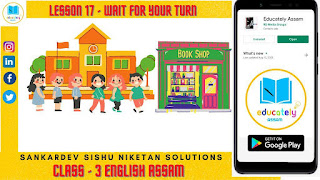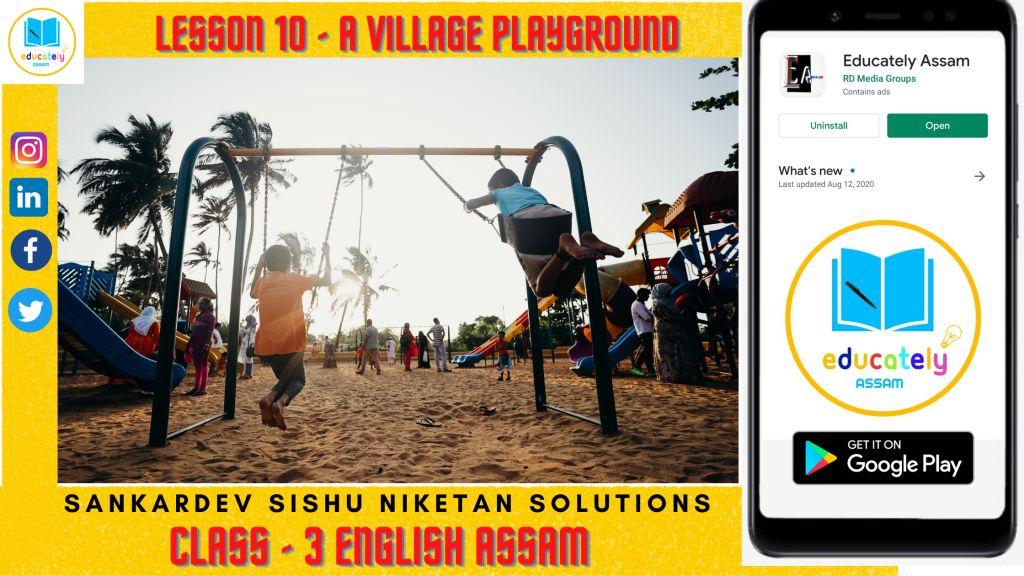Lesson 19 | The story of a smart boy questions answers | Class 3 | Shankardev Shishu Niketan Solutions Assam
 |
| The story of a smart boy questions answers |
THE STORY OF A SMART BOY
(I)
Barun is a boy of seven. He studies in class three. He lives with his parents. His grandparents also live with them. They are a happy family.
(II)
Barun gets up at six in the morning. First, he washes his hands and face. Then he goes to the toilet. He takes a bath with warm water. He takes a glass of milk with biscuits. Then he starts to read and write. He goes to school at eight-thirty. Before that, he takes his meal. He keeps his books and exercise books in the school bag. He takes a tiffin box and a water bottle also. He becomes ready without his parent's help. He is a smart boy.
(III)
Barun plays in the afternoon. He plays with Mrinmoy. Mrinmoy is a sweet child. The child is four years of age. Sometimes a lass also comes to play with them. Her name is Dhriti. The children play in the courtyard. They play hide and seek. Often Barun's grandfather comes to see them. He enjoys the company of the children.
(IV)
Barun's grandfather is an elderly person. He is bald. Barun calls him 'Baldy Grandpa'. Again Grandpa Calls him 'Naughty the Great'. They are good friends. Barun likes to hear folktales from Grandpa. Barun loves his grandmother too. She makes cakes for him.
(V)
One day Barun was playing in Grandma's room. A stick was in his hand. Suddenly the stick hit the looking glass. It was on the dressing table. It broke into pieces. His grandmother was sleeping then. Barun called out. "Look Grandma, I have broken your looking glass. What should I do now?" The old woman looked at him. He was right. She said, 'Oh sweet boy! don't worry. I will buy another mirror soon. But be careful .in future'. 'Thank you, Grandma. I am very sorry. I will play carefully in future, please don't mind', said Barun. Grandma replied, 'that's alright.
(VI)
One day Barun was playing with a ball. An old man was standing on the road. Barun didn't see the man's face. He thought the man was his Grandpa. So he called him, 'Hi baldy Grandpa!'Grandpa. He went to the old man and said, 'Please don't mind, Sir. I mistook you. The old man was amused. 'Oh, my smart boy, don't be nervous. I am just like your grandfather. Anyway, what's your name?' 'My name is Barun'. 'Oh! What a nice name! Do you know its meaning?' 'Yes, I do. Barun is the name of the Rain god.'
(VII)
Barun goes to the reading table at seven o'clock in the evening. He completes his homework himself. Of course, grandpa helps him sometimes. That day Barun was reading with a heavy mind. His grandfather came. Barun told him, 'Grandpa, I called an old · man Baldy'. The Grandfather laughed. 'Do you know, he is my good friend. His name is Sri, Mohan Bora. He told me about you. He feels you are a very smart boy.' 'That's OK Grandpa, but I feel sorry for myself. Grandpa consoled him, 'Do you know Barun, my friend says, you would be a good officer in future. Barun smiled, But you know Baldy, my aim is to be a teacher. I will try to be a good teacher, maybe in a university or 1n a college or in a school'. Grandpa was delighted, 'Oh, what a smart boy you are!'
Class 3 Solutions Shankardev Shishu Niketan Class 3
1. Fill up the blanks :
A) Barun is 7 years old.
B) Mrinmoy is a lad of four years.
C) Grandpa enjoys the company of the Children.
D) Barun's grandfather is an elderly person.
E) Barun's grandmother makes cakes for him.
F) The name of the Rain god is Barun.
G) Barun completes his homework in the evening.
H) Barun is a smart boy.
I) His aim is to be a teacher.
J) Grandpa helps Barun in doing homework.
K) Barun broke his grandmother's looking mirror.
2. Write true or false :
Barun is a smart boy, Because
A) Barun gets up at six in the morning. - True
B) He does not go to school always. False
C) He plays in the afternoon. True
D) He quarrels with his friends. False
E) He completes his homework himself. True
F) He feels sorry for his mistakes. True
G) He does not take his breakfast. False
H) He takes meals before going to school. True
I) He does not forget to take a tiffin box and water bottle. True
J) He never tells a lie. True
3. Answer the following :
A) Who are the playmates of Barun?
Answer: Mrinmoy and Dharitri are the playmates of Barun.
B) Barun loves his grandmother, why?
Answer: Barun loves his grandmother because she makes cakes for him.
C) Barun loves his grandfather, why?
Answer: Barun loves his grandfather because they are like good friends.
D) What is the name of the friend of Grandpa?
Answer: Mohan Bora is the name of the friend of Grandpa.
E) At what time does Barun get up in the morning?
Answer: Barun gets up at six in the morning.
F) At what time does Barun start reading in the evening?
Answer: At 7'o clock in the evening Barun start reading.
G) Barun calls his grandfather 'Baldy', why?
Answer: Barun calls his grandfather 'Baldy', because he is bald.
H) Who did break the mirror into pieces?
Answer: Barun broke the mirror into pieces.
4. Answer the following : (Yes or No)
A) Do you get up early in the morning?
Answer: Yes.
B) Do you go to reading table in the evening?
Answer: Yes.
C) Do you respect your parents?
Answer: Yes.
D) Do you take your breakfast and meal regularly?
Answer: Yes.
E) Do you play with your friends?
Answer: Yes.
F) Do you quarrel with your playmates?
Answer: No.
5. Write five sentences about what you do in the morning before going to school.
Answer:
(i) I wake up at six in the morning
(ii) Then I go to the toilet.
(iii) Take a bath
(iv) Take a glass of milk.
(v) Get ready for school.
6. Why Barun is called 'A Smart Boy'? Write five sentences.
Answer:
(i) Barun gets up at six in the morning.
(ii) He completes his homework himself.
(iii) He feels sorry for his mistakes.
(iv) He takes meals before going to school.
(v) He never tells a lie
7. (a) What did Barun say to his grandmother after breaking the looking glass?
Answer: Barun thanked Grandma for not scolding him and he asked sorry for his mistake and promised his Grandma to be careful in the future.
(b) What was the reply of the grandmother to Barun when she found the looking glass broken?
Answer: Grandma was very happy by the honest behavior of her grandchild. She smiled and said her grandchild to not worry they will buy a new one.

















